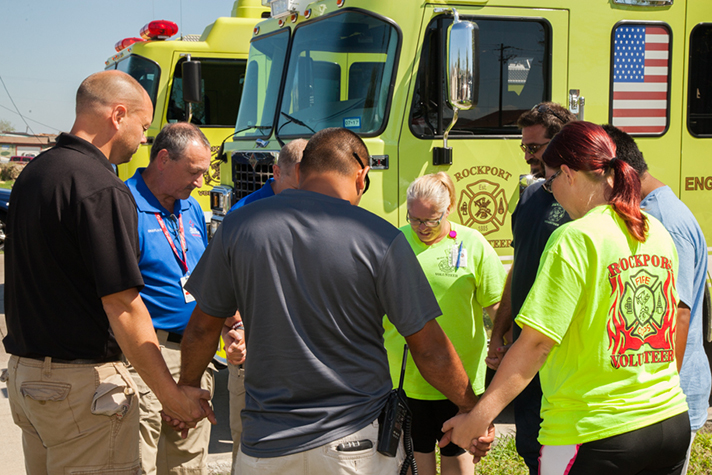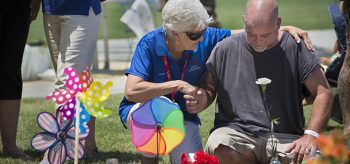
Twenty firefighters sat together in the cavernous fire department.
As the first fingers of Hurricane Harvey began scratching and pulling at the building, the crew improvised. They butted their trucks up against the bay doors to keep them supported and secured.
Conditions worsened as the storm showed its full face.
>> Crisis-trained chaplains are responding in the wake of Hurricane Harvey. You can support the effort.
The power went out. Communication lines went down. Debris slammed against the building, echoing like gunshots. The rafters swayed and shook, heaving as if taking shallow breaths.
“There was a minute when we thought we were going to die,” said Aaron Guerrero, one of the firefighters.
Down the road, Stephanie Newsom supervised the Emergency Medical Services (EMS) team of 16 first responders.
They did all they could do, but eventually their efforts were overwhelmed by the ferocity of the storm as well. The winds escalated to the point where they would flip a top-heavy ambulance. The team had to call off the rescues and find shelter until the worst passed.
“I actually sat in dispatch for a little while and was hearing the 911 calls coming in for service. It was hard for me to tell them we can’t go out. It’s unsafe during the middle of the storm,” said Stephanie, her words and voice expressing the deep love and concern she has for her EMS and dispatch crews, as well as for her community.
“We actually had someone that called in from the northern part of the county asking for help, but the winds were already up to 130 miles an hour. We couldn’t do it.”
In the eye of the storm, they raced out and made 20 dangerous, high-stakes rescues.
Welcome to Rockport, Texas—a town that has been called Ground Zero for Hurricane Harvey.
Facebook Scare
In the chaos of a crisis, bad information can spread almost as fast as the tornadic winds.
Unbeknownst to the firefighters that night, a rumor was quickly spreading via Facebook. The word making its way through the county was that the fire building had collapsed, and all of the firefighters inside were killed in the tragedy.
“For 24 hours we had no contact with our family, so literally for 24 hours everybody thought we were dead,” said Emily Guerrero, wife of Aaron.
“My mom actually was getting messages saying, ‘Sorry for your loss.’ My mom was freaked out,” added Aaron.
“And she had our son with her,” Emily quickly said.
In fact, when things did indeed look their darkest inside the fire station (which, contrary to those social media reports, held strong throughout the storm), Emily’s thoughts weren’t on herself, but on her and Aaron’s little boy.
“My biggest thing was that I thought I would never see my son again,” she said. “And I was like, ‘What the heck am I doing here? Why did I stay?’ I had a big moment of doubt.”
There was great rejoicing when the Guerreros did manage to call Aaron’s mom and their child to tell them that they had survived the storm.
“It was a relief,” said Aaron. “When I made my first phone call to her, she pretty much broke down crying since we were okay.”
‘A Bomb Went Off’
As a new day dawned on this beautiful coastal area, some 200 miles down the Gulf from Houston, the collective of first responders knew that their worlds had changed, literally overnight.
“It felt like a bomb went off outside,” said firefighter Manny Gomez, describing his first thoughts as the devastation became visible. “You know those movies where they’re in a bunker and then they walk out. … That’s what it was.”
The community was in shambles. The pictures one sees on the news don’t begin to offer the full expanse of the widespread devastation. For miles around, trees were uprooted and tossed. The laundromat was a pile of rubble. Steel panels were tied up like shoe laces. Roofs were gone. RVs, boats, and even planes at the nearby airfield were crushed.
Emily couldn’t find her way home, even though she’d lived in the area for 15 years.
“I actually got lost because the landmarks that I’m so used to are gone,” she said. “It took me 20 minutes to find my house.”
When she finally did, she wished that she hadn’t. Her house, the one that Aaron grew up in, was gone.
Sadly, 10 of the firefighters—including the Guerreros and Manny Gomez—lost everything except what they brought with them to the station that fateful day.
Thankfully, Stephanie’s home survived, with the exception of the roof and her brand new fence, as well as a couple of leaks. She’s grateful her house was spared. Her father’s home is also completely gone.
She kept her guard up until all of her crew and her husband—a deputy—were accounted for. She described it as a “sigh of relief” when she knew they were all safe. Then she went right back to work.
‘It’s a Calling’
There’s a long road ahead for each of the first responders, who have not only witnessed calamity in their community, but in their own lives as well. Yet, in the middle of their own struggles, they continue serving.
Why?
“It’s how we’re built,” replied Emily, matter-of-factly.
Aaron elaborated, “It’s a calling. It’s what we’re trained to do and that’s what we always do. We protect each other.”
Manny had a refreshingly practical response. “It’s like I was telling the chaplain: Me going home and seeing the destruction, I ain’t gonna get nothing done. It’s not gonna bring my house back, so I might as well help the people I can.”
Ministry to the First Responders
The Billy Graham Rapid Response Team, a nationwide network of crisis-trained chaplains who are specially prepared to meet the emotional and spiritual needs of people in times of disaster, watched Hurricane Harvey as it stalked into the Gulf of Mexico.
They were already moving chaplains into place before the storm struck. Once it did, the team made it a priority to reach out to the people bearing the heavy burden of caring for their communities.
They had conversations with the first responders, often called “debriefings” (a term used by Critical Incident Stress Management practitioners), which are intended to get people to open up, share their stories, delve into issues that they may be keeping bottled up, and then work their way back out so they can move forward without the pain that has been wearing on them.
“Their mental state is compounded,” said Billy Graham Rapid Response Team Chaplain Jason Smith of North Carolina, who is also an emergency responder back home.
“Not only are they trying to still do their job, but they’re trying to take care of their family, they’ve got to go find a home, they’ve got to go through their house, they’ve got to go through the insurance and FEMA. Everything in their life is piling on, piling on, piling on.
“We’re simply here to help them work through this thing as best we can. We just let them tell their story. Let them tell us what they went through.”
And an amazing thing happens when they tell their story. The chaplains can often see a change happening right before their eyes.
“We’ve done probably 40 or 50 debriefings over nine days, just focusing on them,” said Smith. “We’ve seen in the one-on-ones and the debriefings, people’s countenance go from a hopeless slouch to a bright smile.”
Stephanie Newsom referred to visiting with the chaplains as “kind of a relief.”
A 19-year veteran of emergency response (in fact, the day that Hurricane Harvey struck was her 19th anniversary), she thought she was fine. “So it took a little bit to get me to sit down with them, but once I did, it was kind of humbling. To be able to know it was okay to break down, to let my inner emotions get out there so I could pick my pieces up and go back.”
Manny, the firefighter, smiled as he recalled his conversation with the chaplains: “I had a really good talk with them … finally got a lot of stuff off my chest that I’ve never told nobody. It was like a big old pressure was lifted, honestly.”
With a laugh, he added, “I don’t know how they do it. One second I’m sitting there, quiet. I thought I was going to take a nap. Next second I’m over there crying about something that happened years ago. It was crazy!”
Through the course of these conversations, occasionally the door is opened to share the hope of Jesus Christ to those who need to hear the message. When granted the opportunity, the chaplains prayerfully follow the leading of the Holy Spirit in offering the Gospel.
“Some people are having a spiritual awakening at that moment,” said Kathy Bailey, who—along with her husband Steve—are helping to guide the Billy Graham Rapid Response Team’s efforts in Rockport. “They’re thinking that they almost died and they want to know what would have happened, so we’re able to answer their faith questions.
“They need comfort, they need wisdom, they need to know they’re loved, they need to know they’re accepted, they need to get rid of the guilt. God is there for all of that.” She continued, “There is a God who loves you. He created you. He knows what you’re going through. He wants to be there for you, and He will be if you call for Him. People need to hear that.”
The Way Forward
The community of Rockport and the surrounding region, along with the many other areas affected by Hurricane Harvey, need your prayers. The first responders of this area are a microcosm of widespread suffering, pain and loss.
The days ahead will be hard. Even as the eyes of the nation turn toward Hurricane Irma hurtling toward Florida, the survivors of Harvey will be rebuilding for months and years.
“Please remember this community in your prayers. Hurricane Harvey has passed, but the lives of those who live in Aransas County have been forever changed,” said Steve Bailey. “Pray they rebuild on the sure foundation of Jesus Christ.”
Help send chaplains to disaster-stricken areas where they can provide comfort and hope to those suffering.


